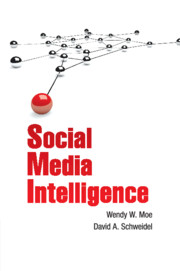Book contents
- Frontmatter
- Contents
- Preface
- Part I Foundations
- Part II Online Opinion or Online Noise
- Part III Conversational Trends
- Part IV Social Media Intelligence
- 7 Managing Social Media Communities for Better Social Media Intelligence
- 8 Cutting through the Online Chatter
- 9 Intelligence Integration
- 10 Building Social Media Intelligence into Our Strategies
- 11 Moving from Social Media Monitoring to Social Media Intelligence
- Index
- References
8 - Cutting through the Online Chatter
from Part IV - Social Media Intelligence
Published online by Cambridge University Press: 05 February 2014
- Frontmatter
- Contents
- Preface
- Part I Foundations
- Part II Online Opinion or Online Noise
- Part III Conversational Trends
- Part IV Social Media Intelligence
- 7 Managing Social Media Communities for Better Social Media Intelligence
- 8 Cutting through the Online Chatter
- 9 Intelligence Integration
- 10 Building Social Media Intelligence into Our Strategies
- 11 Moving from Social Media Monitoring to Social Media Intelligence
- Index
- References
Summary
It has become a staple in American politics that in just about every speech or debate, presidential candidates manage to work in a story about the struggles of Mr. and Mrs. John Smith from a swing state. Candidates talk to thousands of voters on the campaign trail. But these are the stories that they remember and choose to retell because, to them, they represent the stories of the larger population.
It is easy to understand why politicians latch on to these anecdotes. On a daily basis, teams of advisors and crowds of voters share their stories and offer their opinions on everything from taxes to foreign policies to healthcare reform. Even what they wear comes under scrutiny and often garners volumes of unsolicited feedback. How do politicians and other decision makers parse through all of these suggestions to identify the handful of opinions that are truly important and relevant to the larger population? Put bluntly, how do we know that the average American cares about Mr. and Mrs. John Smith’s stories?
- Type
- Chapter
- Information
- Social Media Intelligence , pp. 128 - 144Publisher: Cambridge University PressPrint publication year: 2014

